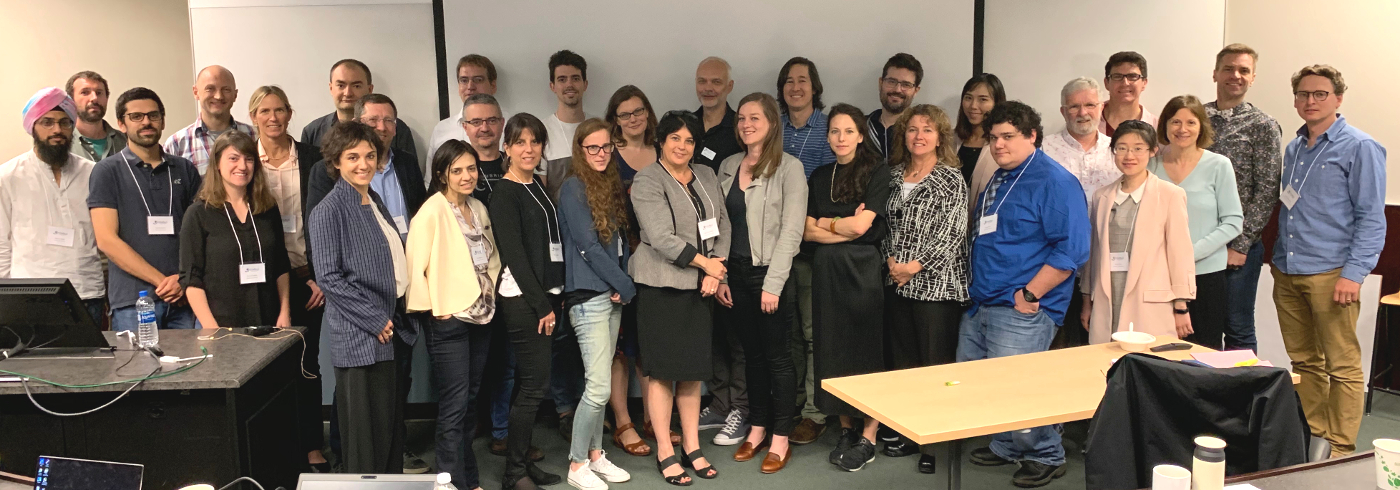| Description | Participants | Agenda | Video |
|---|
DySoC/NIMBioS Investigative Workshop
Social Norms

Topic: Social norms: emergence, persistence, and effects
Meeting dates: April 23-25, 2019
Location: NIMBioS at the University of Tennessee, Knoxville
Organizers:
Michele Gelfand, Psychology. Univ. of Maryland
Nathan Nunn, Economics, Harvard Univ.
Sergey Gavrilets, Center for the Dynamics of Social Complexity (DySoc)/NIMBioS; Ecology & Evolutionary Biology and Mathematics, Univ. of Tennessee
Objectives:
Human social behavior is controlled by many interacting factors including material cost-benefit considerations, genetically-informed social instincts, personality, and culturally transmitted norms, values, and institutions. A social norm is a behavior that one is expected to follow and expects others to follow in a given social situation. Humans learn norms from parents, through educational and religious practices, and from friends and acquaintances, books, and media. The adherence to norms is socially reinforced by the approval of, and rewards to, individuals who follow them and punishment of norm violators. Certain norms are internalized, that is, acting according to a norm becomes an end in itself rather than merely a tool in achieving certain goals or avoiding social sanctions. For individuals who have strongly internalized a norm, violating it is psychologically painful even if the direct material benefits for the violation are positive. Many individuals and groups are willing to pay extremely high costs to enact, defend, or promulgate norms that they consider important. At the same time, virtually all norms can be violated by individuals under some conditions (e.g. if the costs of compliance are too high). A society's values are transmitted through the internalization of norms, with some societies being more successful than others due to their norms and institutions. Society's norms are affected by historical and environmental factors. Some norms are very stable while others can change rapidly. Understanding the emergence, persistence, and effects of social norms is crucial for developing better policies affecting the life of the society as a whole and of its individual members.
This workshop brought together 35 active scholars interested in various aspect of social norms with the aim of stimulating new synergies, insights, and collaborations. The meeting was a transdisciplinary gathering of researchers from diverse disciplines including sociology, anthropology, psychology, economics, evolutionary biology, cultural evolution, neurobiology, political science, history, and experts on extremism, marketing, communications, as well as policy scholars and practitioners.

Summary Report. TBA
Special Guest Baba Brinkman
Workshop special guest Baba Brinkman sat in on the day's discussions and performed his signature "rap up" of the day's events. Read more about Baba's visit and public performance of the world premiere of his Rap Guide to Culture.NIMBioS Investigative Workshops focus on broad topics or a set of related topics, summarizing/synthesizing the state of the art and identifying future directions. Workshops have up to 35 participants. Organizers and key invited researchers make up half the participants; the remaining participants are filled through open application from the scientific community. Open applicants selected to attend are notified by NIMBioS within two weeks of the application deadline. Investigative Workshops have the potential for leading to one or more future Working Groups. Individuals with a strong interest in the topic, including post-docs and graduate students, are encouraged to apply. If needed, NIMBioS can provide support (travel, meals, lodging) for Workshop attendees, whether from a non-profit or for-profit organization.
A goal of NIMBioS is to enhance the cadre of researchers capable of interdisciplinary efforts across mathematics and biology. As part of this goal, NIMBioS is committed to promoting diversity in all its activities. Diversity is considered in all its aspects, social and scientific, including gender, ethnicity, scientific field, career stage, geography and type of home institution. Questions regarding diversity issues should be directed to diversity@nimbios.org. You can read more about our Diversity Plan on our NIMBioS Policies web page. The NIMBioS building is fully handicapped accessible.
NIMBioS
1122 Volunteer Blvd., Suite 106
University of Tennessee
Knoxville,
TN 37996-3410
PH: (865) 974-9334
FAX: (865) 974-9461
Contact NIMBioS




